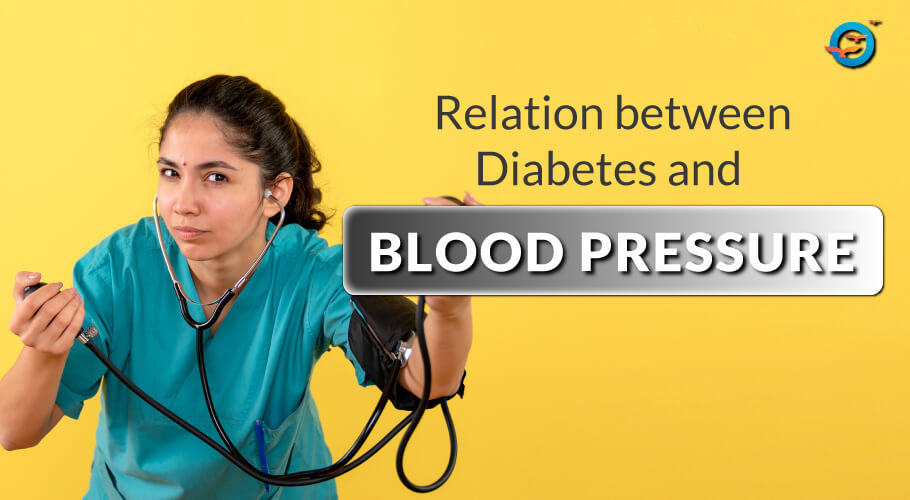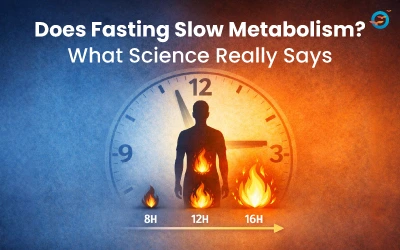Relation between Hypertension (BP) and Diabetes

What is the link between hypertension and diabetes?
Diabetes is a disorder caused by insulin insensitivity or insulin resistance, a condition created when the body either is unable to produce sufficient insulin or is unable to use the insulin produced.
When this happens glucose builds up in the bloodstream which if left unchecked will inevitably lead to diabetes. High blood sugar levels (BSL) have a deleterious effect on every part of the body that is nourished by blood—which is to say, everywhere.
This is why long-term diabetics are susceptible to complications like high BP, high cholesterol, kidney disease, PCOD/s, obesity, and more. One of the most common of these is high BP, and it has a knock-on effect, leading to problems like heart disease, stroke, and kidney disease as well.
The sad truth is that 2/3 of all diabetics suffer from diabetes and hypertension with blood pressure are about four times as likely to contract heart problems as compared to somebody who suffers from neither condition.
What is the easiest way to explain blood pressure?
The easiest way to explain blood pressure is quite simple is the force of the blood against the walls of your arteries. With every beat of your heart blood is pumped into the arteries; if the surface area of the arteries reduces—by virtue of thickening—there will be increased resistance to the blood flow.
This will lead the heart to pump harder and harder. If left untreated this will lead to stroke or cardiac disorder. Consider what happens when you squeeze a rubber ball. Every time you squeeze, the pressure inside the ball builds up, when you release it drops.
The action of a pumping heart is similar. Thus BP measurement has two parameters. One taken at the highest point—called systolic pressure; and one, at the lowest—called diastolic. Both are measured by millimeters of mercury (mm Hg).
Blood pressure is categorized as high if the systolic pressure is above 140 mm Hg and diastolic pressure is more than 90 mm Hg. Your doctor will give it to you as 140/90.
Does Diabetes affect Blood Pressure?
Over time, high blood sugar begins to damage the small blood vessels all over the body. When this happens, the bold vessels begin to thicken and stiffen, increasing the pressure on the blood flow, i.e.high blood pressure.
Resistance to insulin does more than build up sugar in the blood; it also leads to a build-up of insulin, as your pancreas works harder to produce more insulin to overcome the resistance. This extra insulin causes retention of salt and fluids, which increase the risk of high blood pressure.
High BP Symptoms
All too often, people with high BP do not experience noticeable symptoms, leading, no doubt to its sobriquet of 'silent killer'. However, there are some common high BP symptoms you can watch out for. These include headache, dizziness, blurry vision.
But, different individuals may show different symptoms, sometimes mimicking other health conditions. This is why it is critical to have regular check-ups past the age of 40.
High BP Symptoms Treatment
Your doctor will take several factors into account when deciding on a course of high BP treatment. These include your age, overall health, medical history, severity and extent of the high BP, and any sensitivities you may have to specific medications or procedures.
Standard BP treatment included proper and regular exercise, healthy diets, stopping smoking, and any other medications your doctor prescribes.
What should we do when BP is high?
When it comes to chronic diseases, especially ones provoked by lifestyles, prevention is definitely better than the cure. High BP is no different. Some actions you can take are:
- Reduce salt consumption
- Exercise regularly
- Eat a healthy diet
- Do not smoke—or expose yourself to secondhand smoke
- Reduce or stop alcohol
- Regularly check your BP
How high BP affects the brain
High BP, or hypertension to give it its medical name, has a negative effect on the brain, compromising cognitive skills. This is compounded by the effect of high glucose in your bloodstream, which significantly raises the risk of stroke.
plus ways to keep your blood pressure under control and your brain at its best.
Attack the root cause
Be it BP or diabetes, the root cause is insulin resistance. Treat this and there is no reason why your condition shouldn’t reverse itself. Thousands of FFD program participants have experienced this for themselves. As your BSL comes within normal ranges, your BP should also fall within the recommended levels.
You can learn more about the science behind FFD’s reversal programs through articles like this one, our videos on YouTube, and the different programs (many of why are totally free of cost and open to all) we regularly conduct. Subscribe to our channels to stay informed and updated.

